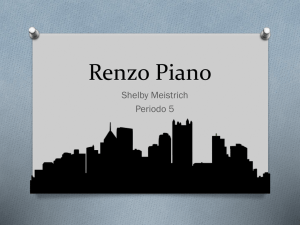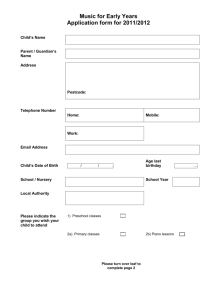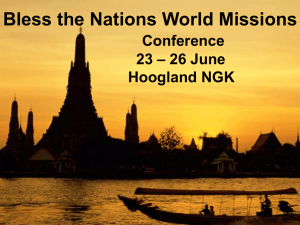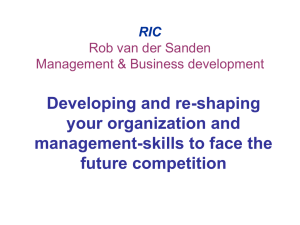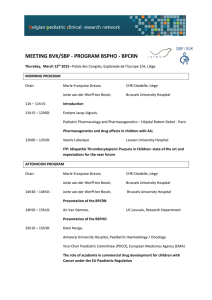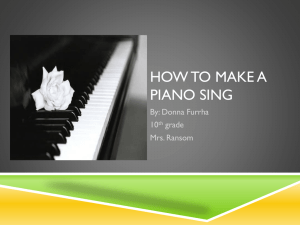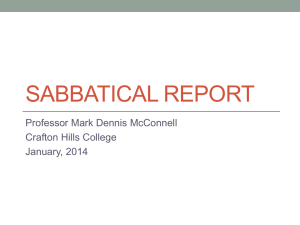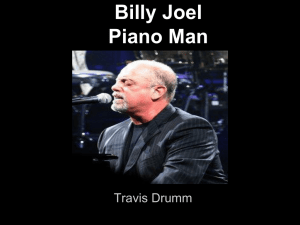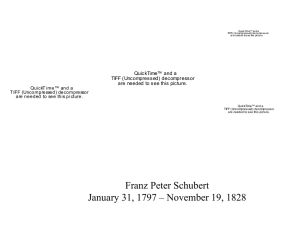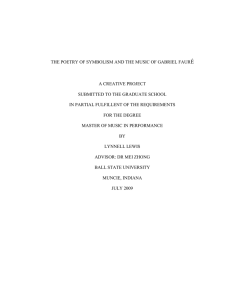Serving Your Audience. Spoken Column – Opening of the Academic
advertisement
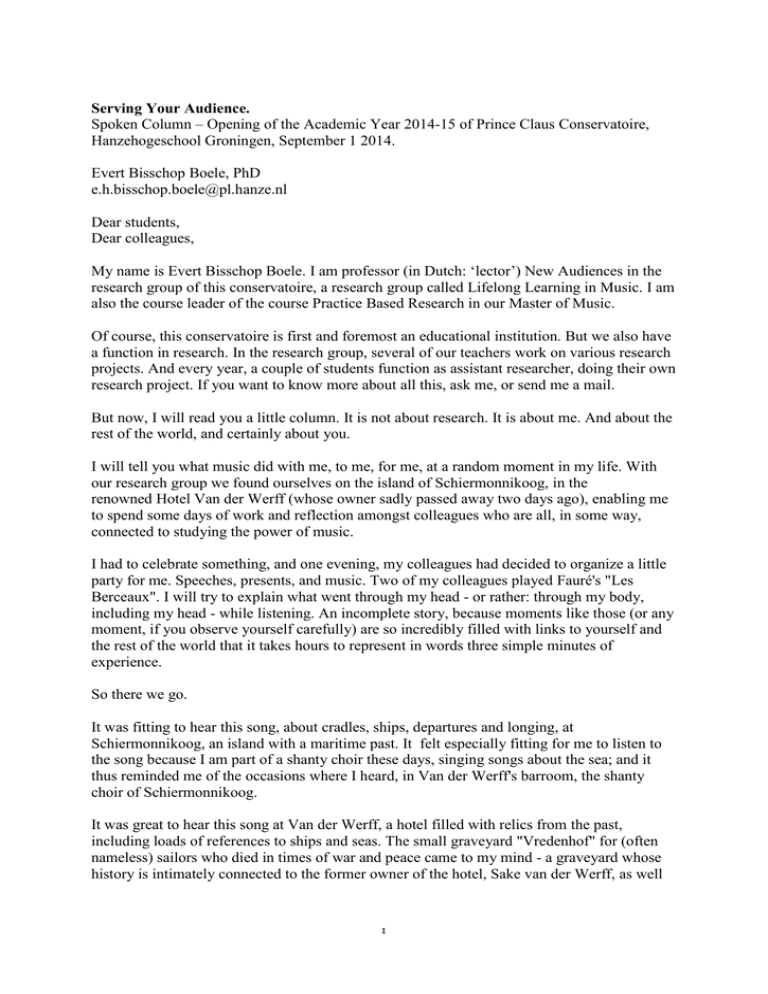
Serving Your Audience. Spoken Column – Opening of the Academic Year 2014-15 of Prince Claus Conservatoire, Hanzehogeschool Groningen, September 1 2014. Evert Bisschop Boele, PhD e.h.bisschop.boele@pl.hanze.nl Dear students, Dear colleagues, My name is Evert Bisschop Boele. I am professor (in Dutch: ‘lector’) New Audiences in the research group of this conservatoire, a research group called Lifelong Learning in Music. I am also the course leader of the course Practice Based Research in our Master of Music. Of course, this conservatoire is first and foremost an educational institution. But we also have a function in research. In the research group, several of our teachers work on various research projects. And every year, a couple of students function as assistant researcher, doing their own research project. If you want to know more about all this, ask me, or send me a mail. But now, I will read you a little column. It is not about research. It is about me. And about the rest of the world, and certainly about you. I will tell you what music did with me, to me, for me, at a random moment in my life. With our research group we found ourselves on the island of Schiermonnikoog, in the renowned Hotel Van der Werff (whose owner sadly passed away two days ago), enabling me to spend some days of work and reflection amongst colleagues who are all, in some way, connected to studying the power of music. I had to celebrate something, and one evening, my colleagues had decided to organize a little party for me. Speeches, presents, and music. Two of my colleagues played Fauré's "Les Berceaux". I will try to explain what went through my head - or rather: through my body, including my head - while listening. An incomplete story, because moments like those (or any moment, if you observe yourself carefully) are so incredibly filled with links to yourself and the rest of the world that it takes hours to represent in words three simple minutes of experience. So there we go. It was fitting to hear this song, about cradles, ships, departures and longing, at Schiermonnikoog, an island with a maritime past. It felt especially fitting for me to listen to the song because I am part of a shanty choir these days, singing songs about the sea; and it thus reminded me of the occasions where I heard, in Van der Werff's barroom, the shanty choir of Schiermonnikoog. It was great to hear this song at Van der Werff, a hotel filled with relics from the past, including loads of references to ships and seas. The small graveyard "Vredenhof" for (often nameless) sailors who died in times of war and peace came to my mind - a graveyard whose history is intimately connected to the former owner of the hotel, Sake van der Werff, as well 1 as to the work of our research group, because we studied a cross arts project at Schiermonnikoog in which Vredenhof played a role. It was also great to hear this song sung by a colleague - we work together intensively about music but have few chances to see one another in action musically. The same counts for the colleague playing the piano part on the upright piano of Van der Werff; it fitted in my image of him as one of those piano players who will play the piano on any occasion without any thoughts about so-called 'appropriateness' or 'artisticity' - of course his playing was appropriate as well as highly artistic (says the connoisseur...) but the main thing was not that but rather the bare fact that he was playing, there and then. At least I thought so. The fact that one of the keys in the piano did not produce any sound at all anymore, as would be demonstrated later that evening by the famous islander mrs. Henriette Pieperiet, couldn't be of any concern. She is, by the way, also known for her great imitation of a tap-dance with her teeth - reminding me of a YouTube video of an African kid doing a human beat box performance with his teeth, which in turn reminded me of another YouTube link where officials in a Ghanaian post office stamp their envelopes as if it is a drum kit. Also the song brought me back to the times when I studied at the Maastricht conservatoire and shared a house with a friend who composed, was an actor, played the flute, lived in a bus later on, but eventually graduated as an opera singer and then went to London (which reminded me of another colleague and good friend, who now lives near Manchester, as two other friends do - I have to visit them soon). One of the first songs this friend had to master when he started his vocal studies at the conservatoire indeed was Fauré's "Les Berceaux", and I remember him having trouble with the high notes for quite some time - but I also remember him mastering the accompaniment although he was not a piano player at all (he also studied Satie endlessly). The piano this friend played on was one we borrowed from another student when he spent some time abroad; I think there was something of a small conflict when we had to hand back the piano to his family but I can't remember the details; it does fit in to an image of myself, however, as a slightly clumsy and socially not very easygoing young student - my God, I had to learn a lot; and did I actually learn, I wondered, sitting at Van der Werff listening to Fauré? I guessed I still have to keep on learning. But also, listening to the song reminded me of the fact what listening to Western art music – be it classical or jazz - intensely and concentrated can do to me - something I spend too little time on these days (family, work, and a broad musical interest all equally stand in the way): feeling a connection to spiraling layers of meaning going deeper and deeper (or higher and higher?) and knowing that you still after all those years only scratch the surface of all that and connecting you to times when on a Sunday morning after a brisk walk we would breathlessly listen to recordings of Beethoven symphonies surrounded by the smell of freshly baked apple pie - or is all of that just nostalgic romanticism? Listening to Fauré, that evening, therefore also pointed towards a possible future in which I would spend more time listening to Western art music again; and it reminded me of the fact that it would be nice to own a complete recording of Beethoven's symphonies on CD, and not only on LP - yes, I still play LPs regularly - so that I can play a movement or two when I feel the need to reconnect to my Artistic Self - one of my many selves. 2 And all that, and much more, went on in my body – including my head – in about three minutes. Multiply those three minutes by 8,736,000 and you know what music may mean in one human being’s life. Multiply that by seventeen million, and you will understand the importance of music in the Netherlands. Or multiply it with six billion, and you will understand the importance of music in this world. Why do I tell you this? You may think that we train independent musicians in this building, and of course we do. But as a musician, you will not be dedicating your life to music, as many people will tell you, and as you may think yourself. You will be dedicating your life to your audience. Music is meaningful to the people of this planet in six billion different ways. And you, in this building, should learn to serve them for the next fifty years of your life. That is what we do: we are training servants. Servants to an audience that desperately needs you to give form to their lives in musical ways you may not even have dreamt of. I wish you a great year. A year in which you develop yourself as a musician. But also a year in which you keep in mind that you are not alone in this world. That you are supposed to mean something for other people. A year in which you develop yourself also as the servant of the six billion people you may be playing for: your audience. Thank you. 3
